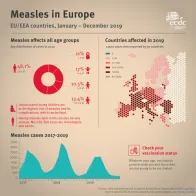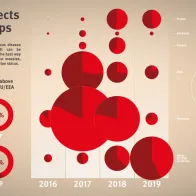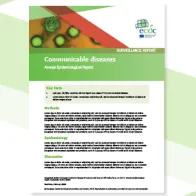Measles continues to spread across the EU/EEA – No time for complacency
The most recent ECDC Measles Annual Epidemiological Report published today shows that in 2019, a total of 13 200 cases were reported by the EU/EEA countries and UK.
In 2019 all EU/EEA countries and the UK reported measles cases. The data shows a decline in measles cases compared to 2017 and 2018 data, when approximately 18 000 cases were reported for each year but this is much higher than the number of cases observed in 2015–2016 (around 4 000 for 2015 and 4 600 cases for 2016) before the start of the current epidemic in Europe. More recent data from the first two months of 2020 also shows fewer cases (1 032) as compared to the first months of the previous three years (average of 3 072 cases).
Despite this decline, the fact that measles cases continue to occur across the EU/EEA shows that vaccination coverage in many countries remains suboptimal.
The ECDC Director Andrea Ammon commented:
‘Although it is encouraging to see a decline in the number of measles cases in the EU/EEA, this is no time for complacency. The spread of measles across EU/EEA countries highlights the importance of continuous efforts to improve the coverage of routine childhood immunisation programmes and of closing immunity gaps in adolescents and adults, who have missed vaccination in the past.
With the COVID-19 pandemic stretching health system capacity, there is a risk that other important health issues that also require our continued attention, are being overlooked. Achieving the best possible vaccine uptake in the current circumstances is crucial in order to prevent measles outbreaks and other vaccine-preventable diseases. Otherwise, too many will miss out on needed vaccinations and we risk an increase in outbreaks and a resurgence of vaccine-preventable diseases’.
Ten deaths were reported in the EU/EEA and UK in 2019, and two in the first two months of 2020.
As presented in an infographic published today and summarizing the data from 2016-19, approximately half of the measles cases in the last three years were older than 14 years. This shows that measles is not only a childhood disease, but it can affect adults as well.
Another infographic, summarizing the data of 2019, shows that 11% of cases were below the age of one; this age group also is the most affected but it is also a group that cannot be fully protected by vaccination as infants are too young to be vaccinated. 2019 data further shows that the majority of cases older than one year were unvaccinated. This highlights shortcomings in the vaccination coverage, and reminds of the importance that all individuals check their vaccination status and get vaccinated if needed.
The data also shows that the ECDC assessment of the measles situation in the EU/EEA done in 2019 remains valid. A risk assessment published in 2019 concluded that the risk of continued widespread circulation of measles in the EU/EEA in the near future is high and that, with the continued importation of measles cases between EU/EEA Member States, the disease is a serious cross-border threat to health in the EU/EEA.
Vaccination coverage of 95% in the population with two doses of measles-containing-vaccine is needed, in order to reach measles elimination and protect those most vulnerable to severe complications and death from the disease, such as infants.
Latest data and risk assessment
Read more on the ECDC website

Measles is an acute illness caused by morbillivirus. The disease is transmitted via airborne respiratory droplets, or by direct contact with nasal and throat secretions of infected individuals.

European Immunization Week (EIW) is marked across the European Region every April. It aims to raise awareness of the importance of immunisation for people’s health and well-being. ECDC supports the European Immunization Week campaign lead by WHO/Europe by providing scientific evidence on immunisation.
More about immunisation
Share this page






